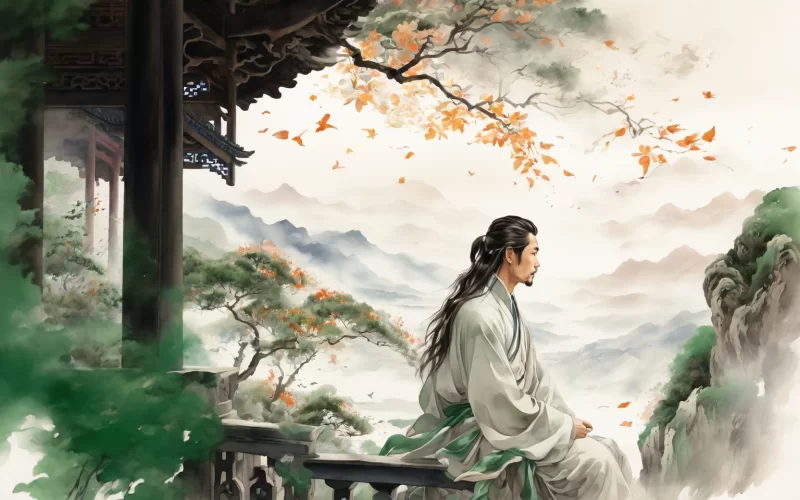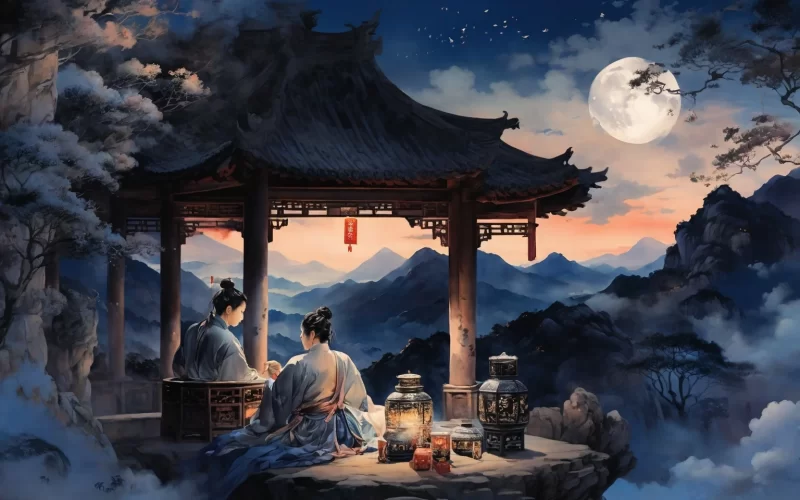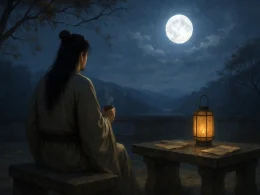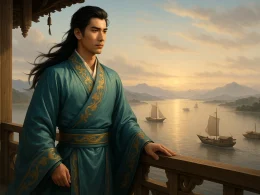All birds have flown away, so high;
A lonely cloud drifts on, so free.
Gazing on Mount Jingting, nor I
Am tired while he gazes on me.
Original Poem
「独坐敬亭山」
李白
众鸟高飞尽,孤云独去闲。
相看两不厌,唯有敬亭山。
Interpretation
Composed during the last decade of Li Bai's life (c. 753–762 CE), this poem reflects the poet's state of mind after experiencing the turmoil of the An Lushan Rebellion, his involvement with Prince Li Lin's case, and subsequent exile. Having witnessed the complete collapse of his political ideals and the fickleness of human relationships, Li Bai's spirit transitioned from his earlier unrestrained exuberance to a profound solitude and clarity. "Sitting Alone in Jingting Mountain" represents the pinnacle of this period, elevating personal experience to philosophical contemplation of the cosmos.
First Couplet: "众鸟高飞尽,孤云独去闲。"
Zhòng niǎo gāo fēi jìn, gū yún dú qù xián.
Flocks of birds vanish high in flight; A lone cloud drifts off in leisure light.
The couplet's brilliance lies in constructing a dynamic process of gradual emptying. "Flocks of birds vanish" symbolizes the end of all worldly bustle, noise, and dependencies—the transition from "presence" to "absence." "A lone cloud drifts off" shows even the last companion (the cloud) actively departing, completing the ultimate purification from movement to stillness, from fullness to emptiness. This is not merely a scene but the poet's existential recognition of the world distancing itself from him.
Second Couplet: "相看两不厌,唯有敬亭山。"
Xiāng kàn liǎng bù yàn, wéiyǒu Jìngtíng shān.
We gaze—never tiring of the view; Only Jingting Mountain and I, just we two.
Within the absolute emptiness established earlier, the relationship between poet and mountain transforms fundamentally. The mountain is no longer an object but an equal existence invited into the poet's subjective world. "We gaze—never tiring" expresses the deepest默契 and recognition in the universe, stemming from their shared qualities—stillness, eternity, and steadfastness. The poet elevates from the loneliness of being abandoned by all things to the solitary existence of communing with cosmic spirit. This "only" is not a reluctant choice but the ultimate confirmation and homecoming after rigorous refinement.
Holistic Appreciation
The poem's artistic achievement lies in accomplishing a spiritual leap from "human loneliness" to "cosmic solitude." The first two lines achieve complete "emptiness" and "relinquishment," as the poet actively or passively sheds all external attachments. The latter two lines achieve ultimate "fullness" and "gain," finding deep connection with the eternal in absolute silence. This portrays not despondent isolation but a solemn, self-sufficient completeness. Jingting Mountain becomes the poet's mirror image; their "mutual gaze" is the soul beholding its own eternity and tranquility. This represents the transcendent state Li Bai reached in his later years—internalizing the High Tang's majestic energy into a quiet yet powerful coexistence with heaven and earth.
Artistic Merits
- Layered Purification of Conception: The progression "birds vanish" → "cloud drifts off" → "mountain and I gaze" completes a purification process from movement to stillness, complexity to purity, external to internal.
- Philosophical Reversal of Subject and Object: In traditional poetry, humans typically observe mountains as subjects. Here, the mountain is elevated to an equal dialogical position, achieving subject-object integration.
- Ultimate Aesthetics of Simplicity: Mere twenty characters contain the full philosophical spectrum from loneliness to existential fulfillment—language reaches utmost simplicity while meaning achieves utmost richness.
- Internalized and Rationalized Emotion: Without explicit emotional outburst, all solitude, seeking, settlement, and transcendence condense into the calm gaze of "we gaze—never tiring," demonstrating high rational restraint and emotional depth.
Insights
This poem reveals wisdom for confronting life's ultimate solitude. It teaches that when the world noisily departs, one need not panic—it may be the space the cosmos clears for encountering one's true self. Li Bai's "sitting alone" is an active "presence," the beginning of connection with higher existence. In modern society saturated with relationships and information, we have nearly lost the ability to "be alone." This poem enlightens us that true spiritual power stems from carving out our own "Jingting Mountain" amid chaos, gaining the capacity for deep dialogue with self and nature. The experience of "gazing without tiring" becomes the anchor resisting external fluctuations and internal anxieties.
About the poet

Li Bai (李白), 701 - 762 A.D., whose ancestral home was in Gansu, was preceded by Li Guang, a general of the Han Dynasty. Tang poetry is one of the brightest constellations in the history of Chinese literature, and one of the brightest stars is Li Bai.












